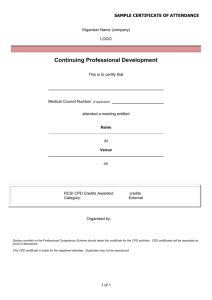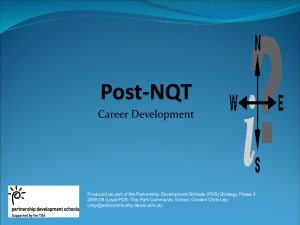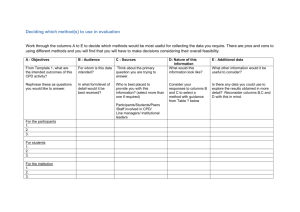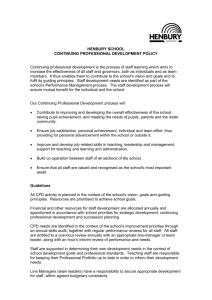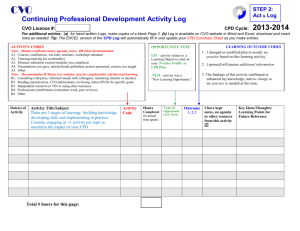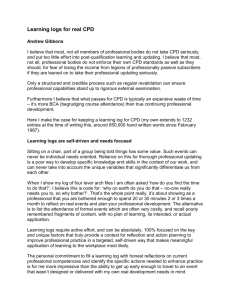Elegant Letter - Career Education Association of Victoria
advertisement
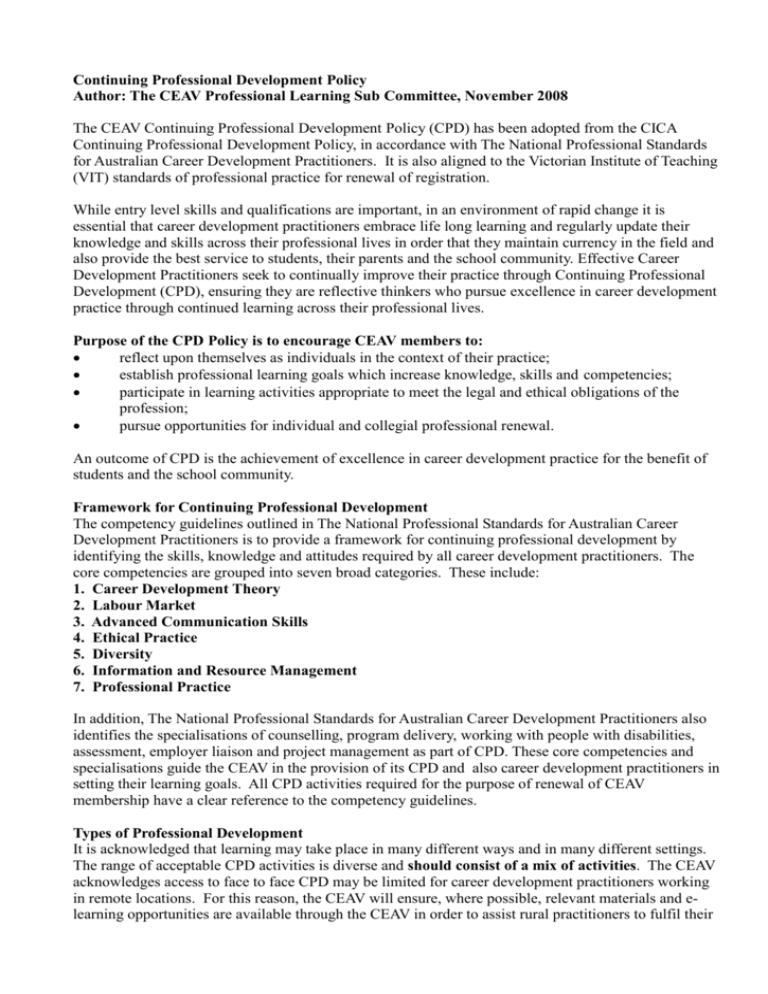
Continuing Professional Development Policy Author: The CEAV Professional Learning Sub Committee, November 2008 The CEAV Continuing Professional Development Policy (CPD) has been adopted from the CICA Continuing Professional Development Policy, in accordance with The National Professional Standards for Australian Career Development Practitioners. It is also aligned to the Victorian Institute of Teaching (VIT) standards of professional practice for renewal of registration. While entry level skills and qualifications are important, in an environment of rapid change it is essential that career development practitioners embrace life long learning and regularly update their knowledge and skills across their professional lives in order that they maintain currency in the field and also provide the best service to students, their parents and the school community. Effective Career Development Practitioners seek to continually improve their practice through Continuing Professional Development (CPD), ensuring they are reflective thinkers who pursue excellence in career development practice through continued learning across their professional lives. Purpose of the CPD Policy is to encourage CEAV members to: reflect upon themselves as individuals in the context of their practice; establish professional learning goals which increase knowledge, skills and competencies; participate in learning activities appropriate to meet the legal and ethical obligations of the profession; pursue opportunities for individual and collegial professional renewal. An outcome of CPD is the achievement of excellence in career development practice for the benefit of students and the school community. Framework for Continuing Professional Development The competency guidelines outlined in The National Professional Standards for Australian Career Development Practitioners is to provide a framework for continuing professional development by identifying the skills, knowledge and attitudes required by all career development practitioners. The core competencies are grouped into seven broad categories. These include: 1. Career Development Theory 2. Labour Market 3. Advanced Communication Skills 4. Ethical Practice 5. Diversity 6. Information and Resource Management 7. Professional Practice In addition, The National Professional Standards for Australian Career Development Practitioners also identifies the specialisations of counselling, program delivery, working with people with disabilities, assessment, employer liaison and project management as part of CPD. These core competencies and specialisations guide the CEAV in the provision of its CPD and also career development practitioners in setting their learning goals. All CPD activities required for the purpose of renewal of CEAV membership have a clear reference to the competency guidelines. Types of Professional Development It is acknowledged that learning may take place in many different ways and in many different settings. The range of acceptable CPD activities is diverse and should consist of a mix of activities. The CEAV acknowledges access to face to face CPD may be limited for career development practitioners working in remote locations. For this reason, the CEAV will ensure, where possible, relevant materials and elearning opportunities are available through the CEAV in order to assist rural practitioners to fulfil their CPD requirements. CEAV members may choose CPD activities that are relevant for their ongoing knowledge and skill development. These include: 1. Participation in conferences Attending conferences at state, national and international levels can be claimed as CPD provided the content is relevant and relates to the member’s professional development needs as a career development practitioner. Attendance at tertiary institution career seminars and regional career briefings can form part of a CPD program provided that not all CPD hours are claimed for this sole activity. CPD hours are based on hours spent attending formal presentations and exclude social events, travelling and lunches. 2. Participation in professional /skill development workshops and activities May include attendance at CEAV (or other CICA associations) professional skill development workshops, workshops conducted by the Department of Education and Early Childhood Development (DEECD), Industry or Employer associations i.e. structured professional development that is not part of a formal qualification, does not involve structured assessment and provides transferable knowledge and skills. Also includes development, delivery and /or participation in webinars or wikipedia activities. CPD hours are based on the number of hours of actual involvement. 3. Reading professional publications These may include books, journals, and career education e-newsletters, specific to career development. Contribution in a calendar year of articles for publication in the CEAV Journal or related career development journals can form part of a CPD program. CPD hours are based on the number of hours of actual involvement. 4. Engaging in professional mentoring Participation in a formal mentoring relationship, with an experienced career development professional or between experienced career development professionals. This may also include mentoring at the New Career Practitioners Conference. CPD hours are based on the number of hours of actual involvement. 5. Academic study in the field of career development This relates to formal education, i.e. learning undertaken in pursuit of career development specific qualifications required to be recognised as a professional or associate career development practitioner. CEAV members undertaking formal education must satisfy assessment requirements to claim CPD hours. It may include formal classroom, and/or distance education. CPD hours can include the actual classes attended. For distance learning, this can be estimated by calculating the equivalent number of hours of formal face to face learning that would have been involved. Members undertaking the Australian Career Development Studies units for credit into a Graduate Certificate in Career Development or a Certificate IV in Career Development can also count this towards academic study. 6. Writing or presenting professional papers This includes the preparation and presentation at conferences, seminars, forums, webinars and workshops. It must be an activity that contributes to the competencies required of career development practitioners. Writing includes, career development related articles for CEAV Journal or other relevant publications, newspapers, reviewing articles or books for publication. CPD hours are based on the number of hours of actual involvement. 7. Active membership of CEAV, career development advisory bodies and other relevant committees Active membership to the profession is an appropriate form of CPD particularly where it extends the continuing professional development of the member involved. This may include sitting on the CEAV committee, or other relevant committees, acting as the Regional President, or as an Executive Member of a Regional Group in your local area, participating in specialised interest groups such as VET in schools or Pathways Groups. 8. Engaging in professional supervision Organised professional supervision with a qualified career development practitioner or other professional. CPD hours are based on the number of hours of actual involvement. Members providing professional supervision to career development practitioners will also accrue CPD hours, i.e. based on the number of hours of actual involvement. 9. Research activities Undertaking research related to career development using procedures that are consistent with the accepted ethical and social research practices. 10. Study tours and exchange or other relevant programs A recognised program such as the DEECD/DEEWR Scholarships and Industry Placement Programs, exchange programs or study tours that relate to the CEAV member’s professional development needs as a career development practitioner. Minimum CPD Requirements It is a requirement of The Professional Standards for Australian Career Development Practitioners that career development practitioners undertake a minimum amount of professional learning relevant to their needs. In accordance with the CICA CPD Policy, the CEAV has determined that career development practitioners accumulate a minimum of 15 hours of CPD per year. This minimum applies to both professional and associate members. Responsibilities of CEAV members CEAV members have a responsibility to: engage in CPD as outlined in the CPD Policy; engage in a variety of CPD, i.e. not all 15 hours can be accrued in one activity; record and retain evidence of their CPD (on line CPD record to be available to CEAV members during 2009); confirm that they have complied with the CPD requirements as part of their membership renewal; provide evidence of their CPD if required by the CEAV; determine the professional learning and development activities that are appropriate to their learning goals. Responsibilities of the CEAV in the delivery of the CPD Policy: provide a robust and engaging professional learning calendar of events which allows all CEAV members an opportunity to complete their CPD program each year; ensure that all CEAV members wishing to use the Professional Standards for Career Practitioners as the benchmark for their practice, access to high quality professional learning opportunities that meet the CPD requirements of the National Career Development Standards; Align were possible all CEAV professional learning activities to the Victorian Institute of Teaching (VIT) Standards for Professional Practice for full registration as a teacher.
